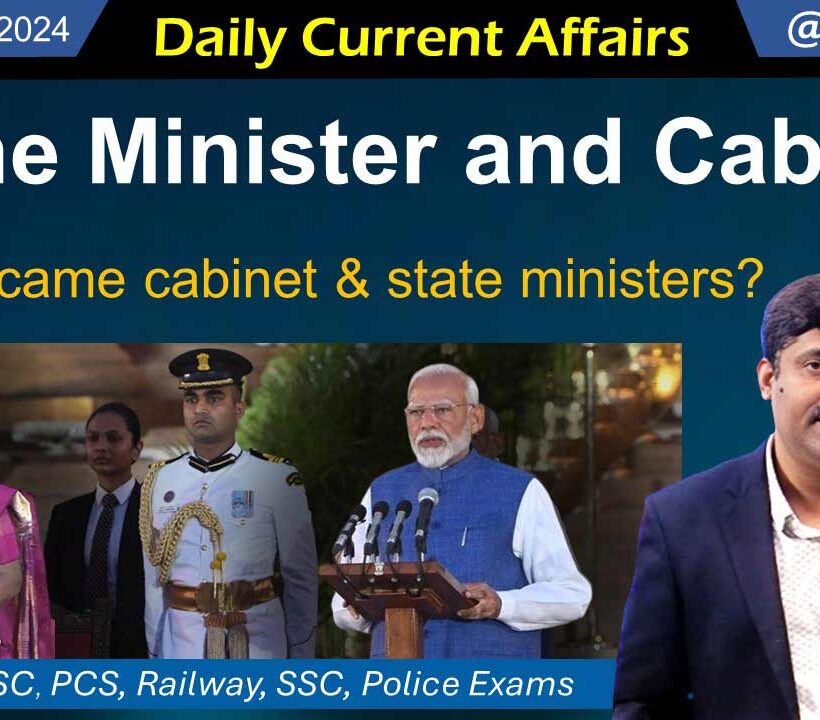This is the current affairs of 9 & 10 June 2024. Here are questions and answers of daily current affairs for better preparation of competitive exams for government jobs.
PDF Download: Click here
1. Narendra Modi will become Prime Minister for how many consecutive times in the year 2024?
a. Second Time
b. Third Time
c. Fourth Time
d. Fifth Time
Answer: b. Third Time
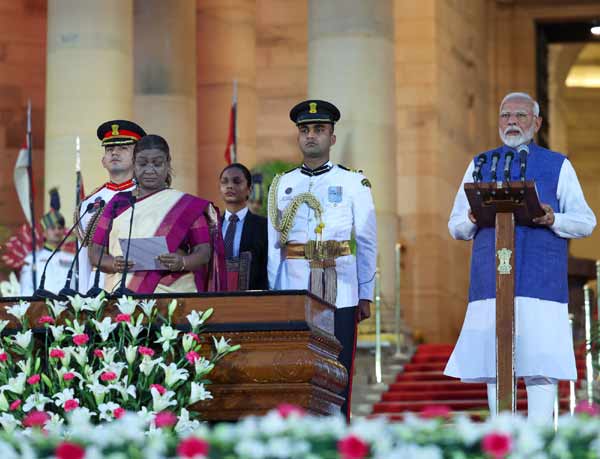
– On Sunday evening, June 9, Narendra Modi took the oath of office as Prime Minister for the third consecutive time. He has become the second PM to do so after Jawaharlal Nehru.
– President Droupadi Murmu administered the oath of office to the 72-member Union Council of Ministers, which included the Prime Minister, 30 Cabinet Ministers, 5 Ministers of State (Independent Charge), and 36 Ministers of State.
– Only 15%, or 11 ministers, in the cabinet are from NDA allies. There are 33 new faces in the cabinet.
What is the oath-taking ceremony?
– It is the formal process of assuming office, wherein the person taking the position pledges allegiance to the Constitution and promises to discharge their duties faithfully.
– At various levels of government, the oath is administered by different officials. At the state level, the Governor administers the oath to the Chief Minister and the ministers. For the Prime Minister and the Union Cabinet, the President administers the oath. The Chief Justice of India administers the oath to the President.
What is the maximum number of ministers?
– The total number of ministers, including the Prime Minister, in the Council of Ministers shall not exceed fifteen percent of the total number of members of the Lok Sabha.
– Elections have been held for a total of 543 seats in the Lok Sabha.
– Thus, there can be a maximum of 81 ministers.
– The oath was taken by 72 leaders. Among them, there are 71 ministers.
————–
2. List of the Union Cabinet Ministers

– Prime Minister, 30 Cabinet Ministers, 5 Ministers of State (Independent Charge), and 36 Ministers of State
Cabinet Ministers
– Rajnath Singh
– Amit Shah
– Nitin Jairam Gadkari
– Jagat Prakash Nadda
– Shivraj Singh Chauhan
– Nirmala Sitharaman
– Subrahmanyam Jaishankar
– Manohar Lal
– H.D. Kumaraswamy
– Piyush Goyal
– Dharmendra Pradhan
– Jitan Ram Manjhi
– Rajiv Ranjan Singh alias Lalan Singh
– Sarbananda Sonowal
– Virendra Kumar
– Kinjarapu Ramamohan Naidu
– Pralhad Joshi
– Jual Oram
– Giriraj Singh
– Ashwini Vaishnaw
– Jyotiraditya M. Scindia
– Bhupender Yadav
– Gajendra Singh Shekhawat
– Annapurna Devi
– Kiren Rijiju
– Hardeep Singh Puri
– Dr. Mansukh Mandaviya
– G. Kishan Reddy
– Chirag Paswan
– C.R. Patil
Ministers of State (Independent Charge)
– Rao Inderjit Singh
– Dr. Jitendra Singh
– Arjun Ram Meghwal
– Jadhav Prataprao Ganpatrao
– Jayant Chaudhary
Ministers of State
– Jitin Prasada
– Shripad Yesso Naik
– Pankaj Chaudhary
– Krishan Pal
– Ramdas Athawale
– Ram Nath Thakur
– Nityanand Rai
– Anupriya Patel
– V. Somanna
– Dr. Chandrasekhar Pemmassani
– S.P. Singh Baghel
– Shobha Karandlaje
– Kirtivardhan Singh
– B.L. Verma
– Shantanu Thakur
– Suresh Gopi
– Dr. L. Murugan
– Ajay Tamta
– Bandi Sanjay Kumar
– Kamlesh Paswan
– Bhagirath Chaudhary
– Satish Chandra Dubey
– Sanjay Seth
– Ravneet Singh
– Durgadas Uikey
– Raksha Nikhil Khadse
– Sukanta Majumdar
– Savitri Thakur
– Tokhan Sahu
– Raj Bhushan Choudhary
– Bhupathi Raju Srinivasa Varma
– Harsh Malhotra
– Nimuben Jayantibhai Bamaniya
– Murlidhar Mohol
– George Kurian
– Pabitra Margherita

In the Union Cabinet, there are three types of ministers:
– Cabinet Ministers, Ministers of State (Independent Charge), and Ministers of State.
– Among these, the Cabinet Minister is the most powerful.
– Next in line after the Cabinet Minister is the Minister of State with Independent Charge. – Third is the Minister of State.
Cabinet Minister
– The most experienced MPs are appointed as Cabinet Ministers.
– Cabinet Ministers report directly to the Prime Minister. They bear full responsibility for the ministry assigned to them.
– Cabinet Ministers can oversee more than one ministry.
– Participation in Cabinet meetings is mandatory for Cabinet Ministers. The government makes all its decisions in these meetings.
– The Cabinet meets as regularly as possible to formulate policies and make decisions on matters of national importance.
Minister of State (Independent Charge)
– Following the Cabinet Ministers, the Ministers of State with Independent Charge come next.
– They also report directly to the Prime Minister.
– They are fully responsible for their ministry.
– Ministers of State with Independent Charge are not accountable to Cabinet Ministers but do not attend Cabinet meetings.
Minister of State
– Ministers of State are essentially appointed to assist Cabinet Ministers.
– They report not to the Prime Minister, but to the Cabinet Minister.
– One or two Ministers of State are appointed under one Cabinet Minister.
– They work under the leadership of the Cabinet Minister and manage all ministry work in the absence of the Cabinet Minister.
—————
3. Leaders of which countries participated in the swearing-in ceremony of Prime Minister Narendra Modi for his third term?
a. Maldives, Bangladesh, Seychelles
b. Bhutan, Sri Lanka, Mauritius, Nepal
c. USA, France, Russia
d. Both a and b
Answer: d. Both a and b (Maldives, Bangladesh, Seychelles, Bhutan, Sri Lanka, Mauritius, Nepal)
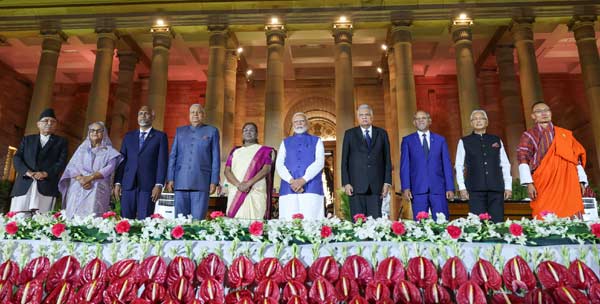
– On June 9, 2024, during the swearing-in ceremony of the new government, leaders from neighboring countries were invited under the ‘Neighborhood First Policy.’
– Leaders from seven countries attended the event.
Leaders from the following countries:
– President of Sri Lanka, Ranil Wickremesinghe
– President of Maldives, Mohamed Muizzu
– Vice President of Seychelles, Ahmed Afif
– Prime Minister of Bangladesh, Sheikh Hasina
– Prime Minister of Mauritius, Pravind Kumar Jugnauth
– Prime Minister of Nepal, Pushpa Kamal Dahal (Prachanda)
– Prime Minister of Bhutan, Tshering Tobgay
What is the ‘Neighborhood First’ Policy?
– The ‘Neighborhood First’ policy is a core part of India’s foreign policy.
– The framework for this policy was prepared in 2008.
– The aim of the Neighborhood First Policy is to strengthen physical, digital, trade relations, and people-to-people connections with India’s neighboring countries.
– The approach of the Neighborhood First Policy is intended to promote stability and development in the Indian subcontinent.
– According to foreign affairs experts, this policy was also initiated to counter the growing influence of China in the region.
– Under this policy, India provided $4 billion in aid to Sri Lanka in 2022, which was struggling with economic difficulties.
Will Relations with the Maldives Improve?
– Since Mohamed Muizzu became President, there has been a state of tension between India and the Maldives.
– However, India invited Muizzu to the swearing-in ceremony, and he attended, calling it an honor.
– This has raised hopes that relations between India and the Maldives will soften.
– In fact, since Muizzu became President last November, there has been tension between the Maldives and India. During his election campaign, Muizzu had raised the slogan ‘India Out’ to remove 88 Indian soldiers from the Maldives.
– After becoming President, his first foreign visit was to China, whereas traditionally, Maldives’ Presidents have made their first official trip to India.
– Meanwhile, Maldivian ministers made controversial statements about PM Modi’s visit to Lakshadweep. Under Muizzu’s leadership, the Maldives expelled Indian soldiers and ended the hydrographic survey project with India.
————–
4. What is the salary of an MP, what facilities do they get?
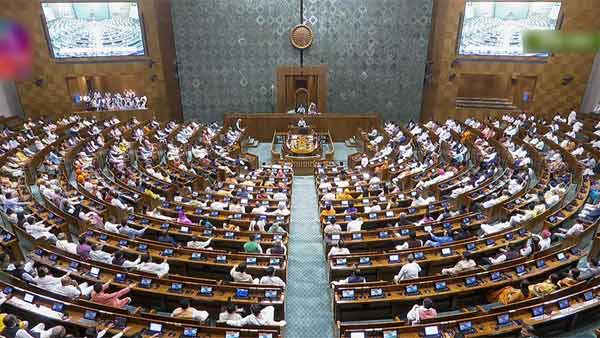
– An MP gets a basic salary of Rs 1 lakh per month. Apart from this, many facilities are available, which are mentioned below.
Let’s first understand what a Member of Parliament (MP) is.
– An MP is a person who is elected to represent in the Parliament.
– Parliament is the highest legislative body of a country where laws are made, government policies are debated, and decisions on national issues are taken.
– In India, Parliament consists of two houses: the Lok Sabha (House of the People) and the Rajya Sabha (Council of States).
Lok Sabha MP:
– Lok Sabha MPs are directly elected by the people through voting.
– The Lok Sabha has a total of 543 members, out of which 233 are elected and 12 are nominated. (However, as per the constitution, the maximum strength of the Rajya Sabha can be 250 seats.)
– Each MP represents a specific electoral constituency.
– MPs are elected for a term of 5 years for the Lok Sabha.
– The minimum age requirement to become a member is 25 years.
Rajya Sabha MP:
– The public does not directly vote in elections for the Rajya Sabha. Its members represent the states.
– Members of the Rajya Sabha are elected by the members of the state legislative assemblies.
– The total number of members in the Rajya Sabha is 245.
– MPs are elected for a term of 6 years for the Rajya Sabha.
– The minimum age requirement to become a member is 30 years.
What do MPs do?
– Making laws: Creating new laws and amending existing ones.
– Oversight of the government: Monitoring what the government is doing and asking questions.
– Keeping an eye on the budget: Passing the country’s budget and focusing on financial matters.
– Addressing people’s issues: Bringing up the problems of their constituents in parliament and trying to find solutions.
How much salary does an MP get?
– An MP receives a basic salary of 1 lakh rupees per month.
– This figure was determined after the recent salary hike in 2018, aimed at aligning their salaries with inflation and the increasing cost of living.
#What allowances and facilities does an MP get?#
Allowances:
– Constituency Allowance: ₹70,000 per month.
Office Expense Allowance: ₹60,000 per month (including around ₹20,000 for stationery and ₹40,000 for assistant staff).
– Daily Allowance: During parliamentary sessions and committee meetings, MPs receive a daily allowance of ₹2,000 for staying in the capital, meals, and other expenses.
Accommodation and Residence:
– MPs are provided rent-free accommodation in major cities during their 5-year term.
– Based on seniority, they may be allotted bungalows, flats, or rooms in hostels.
– Those who choose not to avail official accommodation can claim a housing allowance of ₹2 lakhs per month.
Health Facilities:
– MPs receive health facilities under the Central Government Health Scheme (CGHS), which includes both government hospitals and private hospitals covered under the scheme.
Pension:
– Former MPs receive a pension of ₹25,000 per month after completing their tenure in parliament.
– For each additional year of service, they receive an increment of ₹2,000 per month.
Phone and Internet Facility:
– MPs are provided with an annual allowance for free telephone calls of up to ₹1,50,000.
– They also receive free high-speed internet connections at their residences and offices.
Water and Electricity:
– MPs are provided with free electricity up to 50,000 units and free water supply up to 4,000 kilometers.
————–
5. Who was elected the 79th President of the United Nations General Assembly (UNGA)?
a. Kasaba Crosi
b. Raymond Sima
c. Philemon Yang
d. John Howard
Answer: c. Philemon Yang
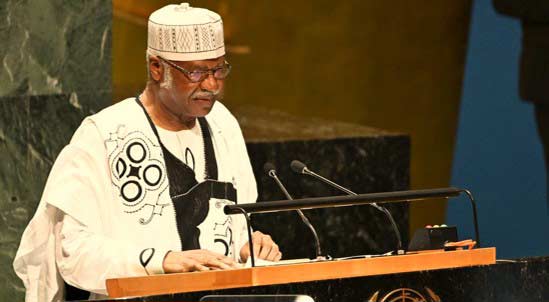
– The United Nations General Assembly has elected former Prime Minister Philemon Yang of Cameroon as its new president.
– Philemon Yang will replace Dennis Francis of Trinidad and Tobago.
– Philemon Yang stated that his goal is to “work together beyond differences and diversity to promote peace. Also to ensure that there is no war and everyone stays united”.
– The 79th session of the Assembly will be held on September 10, and the high-level general debate of the organ will begin on September 24, 2024.
– The theme of the session is: “Unity in Diversity, Peace, Sustainable Development, and Advancement of Human Dignity for All Everywhere”.
Cameroon
– Cameroon is a country located in Central and West Africa. Due to its geographical, cultural, and natural features, it is often referred to as “Africa in miniature”.
– Capital: Yaoundé
– Currency: Central African CFA franc
– Languages: French and English
– Population: 27.9 million (2022)
– Neighboring Countries: Central African Republic, Chad, Equatorial Guinea, Gabon, and Nigeria.
As per the Founding Charter, the United Nations has Six principal organs:
– General Assembly
– Security Council
– Economic and Social Council
– Trusteeship Council
– International Court of Justice
– Secretariat
(Note: These are the main organs. Other specialized agencies such as WHO, IMF, UNESCO, ILO are part of the UN.)
UNGA
– It is one of the six organs of the United Nations.
– The United Nations General Assembly (UNGA) is the primary policy-making body of the UN.
– UNGA is composed of all member states of the United Nations. Each member state has one vote in the General Assembly.
– UNGA holds regular sessions from September to December every year. Special sessions may be called by the Secretary-General upon the request of a majority of the members of the Security Council or of the United Nations.
UNGA also makes significant decisions for the UN, including:
– Appointment of the Secretary-General upon recommendation of the Security Council
– Election of non-permanent members of the Security Council
– Approval of the United Nations budget
United Nations
– Secretary-General: António Guterres
– Headquarters: New York, USA
————–
6. Name the five new non-permanent member countries of the United Nations Security Council (UNSC) elected in June 2024?
a. Pakistan, Somalia, Panama, Denmark and Greece
b. Japan, Somalia, Malta, Denmark and Greece
c. Switzerland, Ecuador, Panama, Mozambique and Greece
d. Pakistan, Malta, Panama, Japan and Ecuador
Answer: a. Pakistan, Somalia, Panama, Denmark and Greece
– The 193-member United Nations General Assembly held elections for five vacant seats through secret balloting.
– These five countries were elected as non-permanent members of the United Nations Security Council for a two-year term from January 1, 2025, to December 31, 2026.
– The elected member countries are Japan, Mozambique, Ecuador, Malta, and Switzerland. Their term ended on December 31.
– The United Nations Security Council, responsible for international peace and security, consists of five permanent and ten non-permanent members.
Pakistan Elected for the Eighth Time
– Pakistan, elected as a non-permanent member for the eighth time, expressed its readiness to work with the United Nations Security Council and other members.
– Pakistan’s Prime Minister, Shahbaz Sharif, expressed happiness at the election.
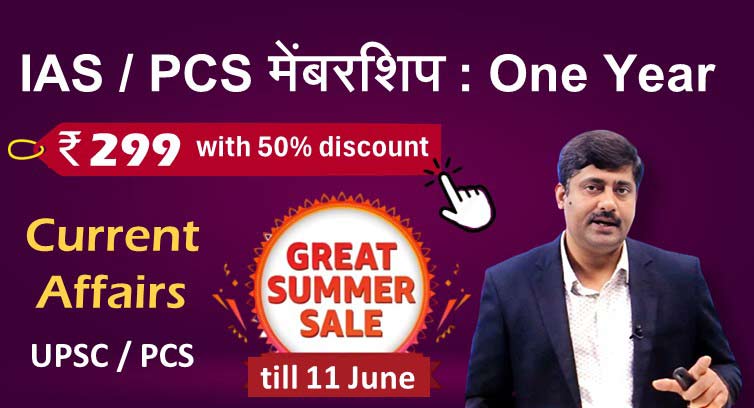
————–
7. Ramoji Rao, Chairman of Ramoji Group of Companies, passed away. Which highest honour did he receive?
a. Padma Bhushan
b. Padma Vibhushan
c. Ramon Magsaysay
d. Pulitzer Prize
Answer: b. Padma Vibhushan (in 2016)
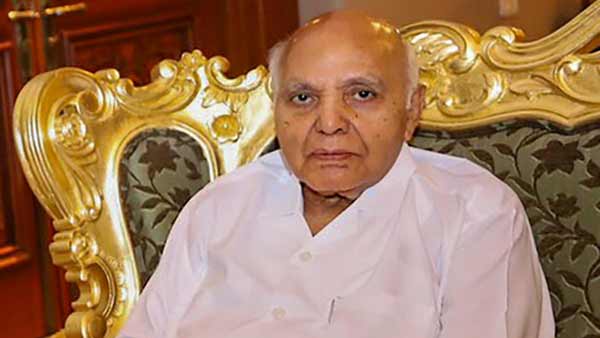
– Ramoji Rao, the Chairman of Ramoji Group of Companies, passed away on June 8, 2024, at a hospital in Hyderabad. He had been ill for a long time.
– Prime Minister Narendra Modi expressed sorrow at his demise.
– Ramoji Rao was considered a prominent figure in the media world. He owned Ramoji Film City and the ETV Network.
– He was honored with the Padma Vibhushan in the year 2016.
– He was an Indian film producer and the head of the production company Ushakiran Movies, also known as Cherukuri Ramoji Rao.
– He was the owner of the world’s largest film production facility, Ramoji Film City.
– He was also honored with National Awards and Filmfare Awards for his significant contributions to the cinema industry.
————–
8. Who took over as Director General of Employees’ State Insurance Corporation (ESIC)?
a. Abhishek Mehrotra
b. Sandeep Batra
c. Kamlesh Sahni
d. Kamal Kishore Soan
Answer: d. Kamal Kishore Soan
– Kamal Kishore Son, a senior IAS officer of the 1998 batch from the Jharkhand cadre, took additional charge as the Director-General of ESIC on May 31, 2024.
– The Employees’ State Insurance Corporation (ESIC) is a department under the Ministry of Labour and Employment.
– Kamal Kishore is currently serving as the Additional Secretary and Director-General in the Labor Welfare Department of the Ministry of Labour and Employment.
PDF Download: Click here

